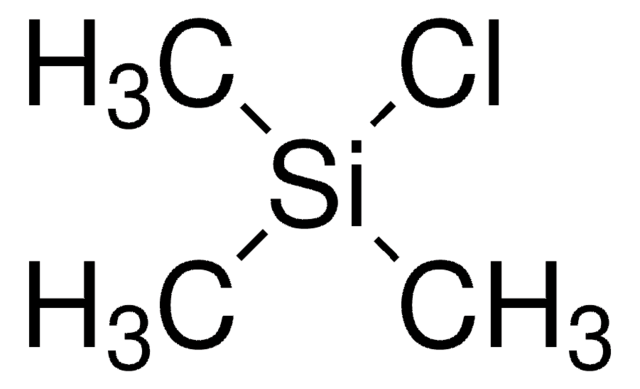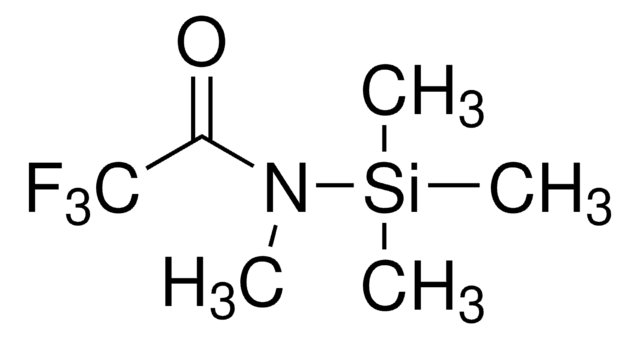52619
Hexamethyldisilazane
for GC derivatization, LiChropur™, ≥99.0% (GC)
Sinónimos:
HMDS
About This Item
Productos recomendados
grade
derivatization grade ((GC derivatization))
for GC derivatization
Quality Level
assay
≥99.0% (GC)
form
liquid
quality
LiChropur™
reaction suitability
reagent type: derivatization reagent
reaction type: Silylations
technique(s)
gas chromatography (GC): suitable
refractive index
n20/D 1.407 (lit.)
n20/D 1.408
bp
125 °C (lit.)
SMILES string
C[Si](C)(C)N[Si](C)(C)C
InChI
1S/C6H19NSi2/c1-8(2,3)7-9(4,5)6/h7H,1-6H3
InChI key
FFUAGWLWBBFQJT-UHFFFAOYSA-N
¿Está buscando productos similares? Visita Guía de comparación de productos
Categorías relacionadas
General description
Application
It may be used as a derivatizing reagent for the analysis of bioamines and their acidic metabolites, phenol, hydroquinone and catechol in urine samples, mixtures of free fatty acids and metal soaps in paint samples using gas chromatography/mass spectrometry (GC/MS).
Features and Benefits
- HMDS is inexpensive and has a relatively low boiling point (124-127 °C).
- It can be used without solvent but its silylating power can be increased by various (mostly acidic) catalysts.
- The only reaction byproduct, ammonia, can leave the reaction mixture as the reaction goes to completion.
Other Notes
Legal Information
signalword
Danger
Hazard Classifications
Acute Tox. 3 Dermal - Acute Tox. 4 Inhalation - Acute Tox. 4 Oral - Aquatic Chronic 3 - Flam. Liq. 2
Storage Class
3 - Flammable liquids
wgk_germany
WGK 2
flash_point_f
52.5 °F - closed cup
flash_point_c
11.4 °C - closed cup
ppe
Faceshields, Gloves, Goggles, type ABEK (EN14387) respirator filter
Elija entre una de las versiones más recientes:
¿Ya tiene este producto?
Encuentre la documentación para los productos que ha comprado recientemente en la Biblioteca de documentos.
Artículos
Results of a study involving the ability few Fluka silylating reagents to form GC-MS-compatible trimethylsilylmethyl derivatives of NSAIDs
Nuestro equipo de científicos tiene experiencia en todas las áreas de investigación: Ciencias de la vida, Ciencia de los materiales, Síntesis química, Cromatografía, Analítica y muchas otras.
Póngase en contacto con el Servicio técnico






